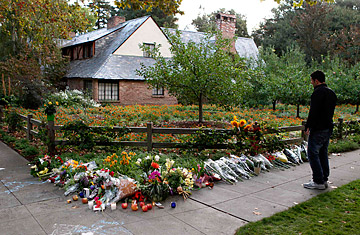
Flowers, candles and apples adorn the sidewalk outside the home of Steve Jobs in Palo Alto, California, in the early morning October 6, 2011.
By the time Rakesh Achanta and Chris Young, two electrical engineering masters students at Stanford, got to Steve Jobs' home in Palo Alto it was past midnight. "We just had to come pay homage," said Achanta, 28, from Hyderabad, India.
"He was just such a gigantic influence," echoed Young, 25, from San Antonio.
The two squinted in the candlelight at the chalk and crayon messages of love and condolences scrawled across the sidewalk in front of the English country home, just a block and a half from Google CEO Larry Page's house. Flowers lined the wooden fence, behind which stand three apple trees just dropping their fruit. On several of the fence posts, fans had placed apples with one bite taken out of them, a reference to the Apple logo. Interspersed amongst the flowers were iPhone boxes wrapped with notes and even a first-generation iPod with "Steve Jobs 1955-2011" written on it in black marker.
Since the announcement Wednesday evening that Jobs, 56, co-founder and chairman of Apple, had died, a steady stream of visitors have come to his home to pay their respects. Police barriers block vehicular traffic down a side road, but otherwise people are allowed to wander around the property where Jobs' wife Laurene and their three children still reside. That night, a similar scene was playing out at two other locations across town. At the Apple Store Jobs himself used to frequent a mile-and-a-half away on Palo Alto's main drag, people left candles, poems — some slightly singed from the flickering flames — and flowers. Steve Jobs/ the pursuit of beauty and excellence/ demanding perfect ..." read the beginning of one lengthy tribute.
But the biggest memorial was at Apple headquarters at 1 Infinite Loop in Cupertino 10 miles away, where seven satellite trucks tracked people streaming through with flowers, balloons and mementos. Six Chinese computer science students from nearby colleges used tea candles to created a big Apple logo and write "Jobs" in English and Chinese on the pavement. At the foot of a bench, swamped with flowers and condolences, red candle wax ran in rivulets along the pavement grooves. "You can read about Gandhi, about people of that level, but it's rare that you could interact with them, meet them," said Ishdeep Sawhney, a software developer for Apple originally from Delhi. "We all knew his health wasn't doing well, but this was a shock." Sawhney, accompanied by his teary wife Bino Kohli, a product developer at Oracle, had come to pay his respects to the man whose sheer work ethic lured Sawhney from Microsoft five years ago.
Jobs announced to his employees in mid-2004 that he'd been diagnosed with pancreatic cancer. In April 2009, he underwent a liver transplant. And then in August, he announced his resignation as CEO due to health reasons. On Monday, he succumbed to an unknown disease in the presence of his family. "We'll miss you, Steve," read one thank you card. "We believe that people with passion can change the world for the better."
Jobs certainly didn't lack in passion. He was an infamously demanding boss. "I can't decide whether or not to be sad," said one employee who didn't want to be named, walking up to the office memorial. But he was unquestionably brilliant. "He was a big influence on my life," said Richard Jordan, 39, a Brit who works in tech start ups and used to know Jobs as a neighbor in Palo Alto. "He was a big influence on most people's lives around here. He was one of Silicon Valley's founding fathers."
In recent years Jobs has given the world the iPod, iPhone, iPad, and iCloud. But perhaps the biggest loss is of the innovations he'd yet to realize. He also didn't live to see his new home or offices completed — both are in the works. In fact, it was his charging ahead with the new projects that had led many close Jobs watchers — he was infamously private — to speculate that his health wasn't that bad. But, clearly, it was.
"Who knows, Chris, maybe you're the next Steve Jobs," electrical engineering student Achanta said to his fellow mourner outside Jobs' Palo Alto home. "Yeah, and you're Woz," Young shot back, referring to Apple co-founder Steve Wozniak.
But Achanta was already reconsidering. "But you wouldn't want to die at 56. I know I wouldn't," he mused. "Though, I suppose I would if I could make an impact like Jobs did. Okay, I'd be the next Steve." By half-past midnight the pair were on their way back to school, having left a note on the only piece of paper they had, a Post It. It read: "An apple falls to the ground to become a shade-giving tree."
Cupertino police were on especially high alert with all the late night pedestrian traffic since the city was the site of an early morning mass shooting. Early Wednesday morning Shareef Allman allegedly opened fire at the cement plant where he worked starting a rampage that left four dead and seven wounded. The 47-year-old is still at large and Silicon Valley remains bunkered down for one of the largest manhunts in its history, all while mourning Jobs' loss.
